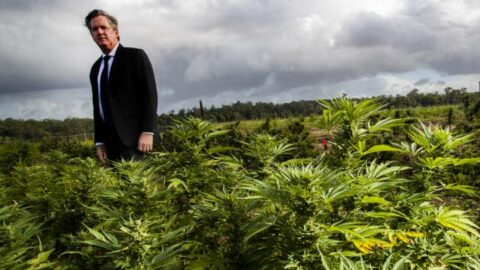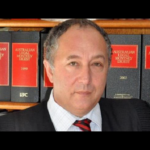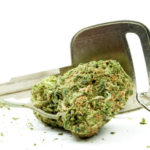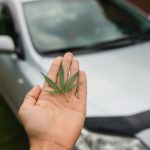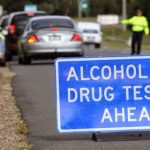“Frankly Fed Up” With Unjust Drug Driving Laws, Says Legalise Cannabis’ Bernard Bradley
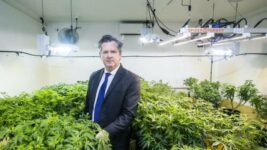
Right now, Legalise Cannabis Australia candidate Bernard Bradley is continuing to threaten the future of Pauline Hanson’s political career, as the pair are in a race to take out the final Queensland Senate seat.
The fact that a single-issue party calling for legalised cannabis is giving the far-right politician – who has built her career on white racist issues – a run for her money shows that there has been a political shift in this country that’s reflected right across the various voting results.
But to refer to Legalise Cannabis as merely focused on one issue is unfair, as not only is it seeking the lawful adult use of the plant, but it’s calling for a regulated market, including small producers and homegrow provisions, greater accessibility to the medicine and an end to unfair drug driving laws.
Bradley, a lawyer from Noosa, doesn’t even use cannabis himself. Indeed, it’s the unjust way the law is being applied in terms of cannabis, which he’s witnessing on a daily basis as part of his practice, that pushed him to run for parliament on a platform prioritising cannabis law reform.
Illegitimate laws
Queensland has similar laws to NSW when it comes to drug driving. And while some jurisdictions aren’t as regressive, all states and territories nationwide operate roadside drug testing regimes that test drivers for the presence of substances in their system, not for levels or impairment.
So, unlike random breath testing for alcohol, which ascertains whether a person is too drunk to drive safely, drug driving tests for any presence, even small traces, giving no indication as to whether a driver smoked a joint last week, the night before testing, or ten minutes prior.
Currently, people across the country are being fined and losing their licences for cannabis driving whilst not being stoned when testing. And further, those legally using cannabis medicine prescribed by a doctor either can’t drive or do so at the risk of falling foul of these laws.
Reasonable access to medicine
The Noosa criminal defence lawyer, who outpolled Clive Palmer’s party for the Queensland Senate, has also been representing clients who’ve fallen short of the law for producing their own medicinal cannabis because they can’t afford the prescribed substance.
Medicinal cannabis use was legalised in 2016. However, the accessibility of legal cannabis medicines was out of reach for most patients for the first few years, and, at present, it continues to be so for those who cannot afford the steep prices of the product or for obtaining prescriptions for it.
But, meanwhile, down in the ACT, the seat of federal government, the recreational use and possession of the drug has been completely legal since 31 January 2020. And locals can cultivate up to two plants at home without fear of persecution from the law.
Sydney Criminal Lawyers spoke to Queensland lawyer Bernard Bradley about the reasons he was motivated to run for the Senate on the Legalise Cannabis Australia ticket, his reaction to the sizable cannabis vote this election, and how the country has spoken on cannabis law reform.
As we speak, you’re still in the running for the final Queensland Senate seat against Pauline Hanson.
Mr Bradley, as you went into the election running for Legalise Cannabis Australia, which is seen as a fringe party even when compared to One Nation, what’s it been like to find yourself in this race with one of the nation’s most divisive politicians?
It’s my first foray into politics and the level of support we received in Queensland has been a pleasant surprise.
I certainly didn’t expect to get close to Pauline Hanson and am frankly amazed that we’re ahead of Clive Palmer given the massive resources he poured into his campaign.
Realistically, Pauline will be returned although there’s also the possibility of the LNP picking up a 3rd Senate spot on the current numbers.
We’ll see – the AEC hasn’t even finished counting the primary vote, and I expect the distribution of preference will take quite a while.
You ran for Legalise Cannabis Australia, however you don’t use the substance yourself. So, why did you go to the trouble to run for a party that has cannabis reform as its main priority?
I was primarily motivated by my three decades’ experience as a criminal defence lawyer.
I became frankly fed up with seeing lives and livelihoods upended by people being convicted for returning a positive roadside presumptive drug test and the usually mandatory disqualification of licence that comes with it.
In Queensland, the holders of an open class C licence, who have not in the preceding five years been disqualified or suspended from driving, may apply for a restricted work licence if the refusal of one would cause them severe financial hardship.
Holders of a provisional licence, usually younger people, cannot so apply, so they lose their jobs for three months if their boss can’t make arrangements around them.
Some people, due to housing costs, live miles from their workplace and usually where there is insufficient public transport, so they simply cannot get to work if no one else can drive them, and they lose their job as a result.
Of course, they’re also unable to get to medical appointments, take kids to school, care for relatives – the list goes on. I mean, what is this costing the economy?
These tests are overly sensitive and provide no indication of the level of cannabis in a person’s bloodstream or whether their driving was in any way impaired.
The manufacturers claim they will only test positive within four hours of using cannabis, but time and time again, I’ve had clients who say they had a joint the night before and tested positive the next day.
I’ve spoken to many colleagues about this who’ve had the same experience with clients.
It amounts to a retrospective possession charge where people automatically lose their licence and the impact of that can be dire.
A magistrate in northern NSW, David Heilpern, resigned in disgust over this very issue a couple of years ago and now campaigns actively to change a similar law in NSW.
So, the state government gave people the option to seek treatment via medicinal cannabis, but in effect, and because of the sensitivity of these roadside presumptive tests, has taken away their ability to drive anywhere, lest they get caught and fined and have their licence disqualified anyway.
So, one almost has to make a choice: take medicinal cannabis or drive a vehicle. Seriously? Was this thought through?
A more accurate test could, of course, fix this problem, but until that is available, this offence should be excised from the Act.
I am also motivated by criminal cases of production of cannabis, where people had turned to cannabis to alleviate pain for chronic medical conditions but cannot afford to buy it on prescription.
The benefits of medicinal cannabis for people with chronic pain and illness are well-documented and authorities have acknowledged this by allowing access by prescription.
But it remains prohibitively expensive for many people, particularly for those who were unable to work due to their medical conditions.
I represented a woman in her 70s recently, who was forced to front up to court for growing plants at home to make cannabis oil for relief from chronic arthritis.
She had a prescription but couldn’t afford to fill it.
I represented a fellow with shocking PTSD, who couldn’t leave the house. He grew his own crop for CBD production and was able to re-join the community as a functioning human being.
He was raided and charged with production, of course, and whilst he was fined and no conviction was recorded, there remains an entry on his criminal history. He now pays through the nose for oil of inferior quality, on prescription.
Why on Earth should someone have to pay exorbitant prices for a product they could make at home for free?
It’s grossly unfair and discriminates against people on meagre incomes who are already suffering.
Going into this election there was a lot of focus on issues of climate and corruption, as well as the growing opportunities to vote for independent candidates championing these causes.
So, what does it tell us that during such an important election, Legalise Cannabis Australia took out between 2 to 7 percent of the upper house vote in every jurisdiction?
It tells us that far from being a fringe issue, there are many discreet cannabis users who are law-abiding, responsible citizens who should not have to fear the long arm of the law intruding into their lives.
From the perspective of a legal professional, what sort of determinantal impact is cannabis prohibition having on the criminal justice system?
I’m a duty lawyer in the Noosa Magistrates Court once a fortnight and about a third of the people I see in that role are charged with cannabis offences: mostly minor possession and roadside drug testing charges.
The current approach is clearly soaking up police and court resources unnecessarily and causing unnecessary grief in the community.
Roadside presumptive testing is supposed to provide a deterrent for driving under the influence, I assume.
But there are already harsh penalties for driving under the influence to act as a deterrent in the ordinary way.
You’re more of a danger to other road users if you are tired than having a drug present in your saliva, provided you’re not under the influence of the drug. Do the police test for tiredness?
People, especially young people – who do not qualify in Queensland for a restricted work licence – are losing their jobs for returning positive presumptive roadside tests.
Magistrates in Queensland are told by the manufacturers of the testing kits that they will not detect cannabis consumed more than four hours earlier.
This is simply not correct. They are much more sensitive than that.
I’d love to see some independent testing done or for a client to challenge one. However, none to date have had the financial means to do so.
Not that I would charge them: the cost would be in the forensic testing and expert evidence required.
So, in considering the negative outcomes the criminalisation of the fairly innocuous substance has, why does cannabis continue to be illegal in this country?
You tell me. “It’s a gateway drug”, according to Andrew Bolt earlier this week, who then went on to tell the story of his Uncle Charlie who claims that cannabis cured his cancer.
There are numerous examples around the world where cannabis has been legalised and the sky hasn’t fallen in.
It’s ridiculous that the laws are inconsistent around the country. In our national capital, it’s perfectly okay to grow a couple of cannabis plants in your yard, but in Queensland, you can be charged with a criminal offence for the same thing.
The approach in the ACT hasn’t led to negative consequences there. Cannabis was actually legal everywhere in Australia until 1957, when we decided to jump on the USA bandwagon and ban it.
I believe it’s time to change these outdated laws and have a uniform approach that treats adults like adults and would vastly improve some people’s quality of life.
And lastly, Mr Bradley, a Labor-Greens government legalised cannabis for personal use and possession in the capital territory over two years ago.
So, as you’ve just mentioned, we now have one jurisdiction where recreational use is perfectly legal, whilst you can be arrested in all others. And with the election, there’s been this loud call for change nationally.
In your opinion, what’s likely to happen from this point on with cannabis prohibition in Australia?
The calls will continue to get louder until state and the NT jurisdictions are persuaded to act.
Making cannabis and CBD oil legal by prescription has opened the door. And I congratulate governments for doing so.
But by taking that action, they have acknowledged that cannabis is an effective treatment for a range of conditions.
As I said earlier, there are numerous examples around the world where cannabis has been legalised and the sky hasn’t fallen in.
